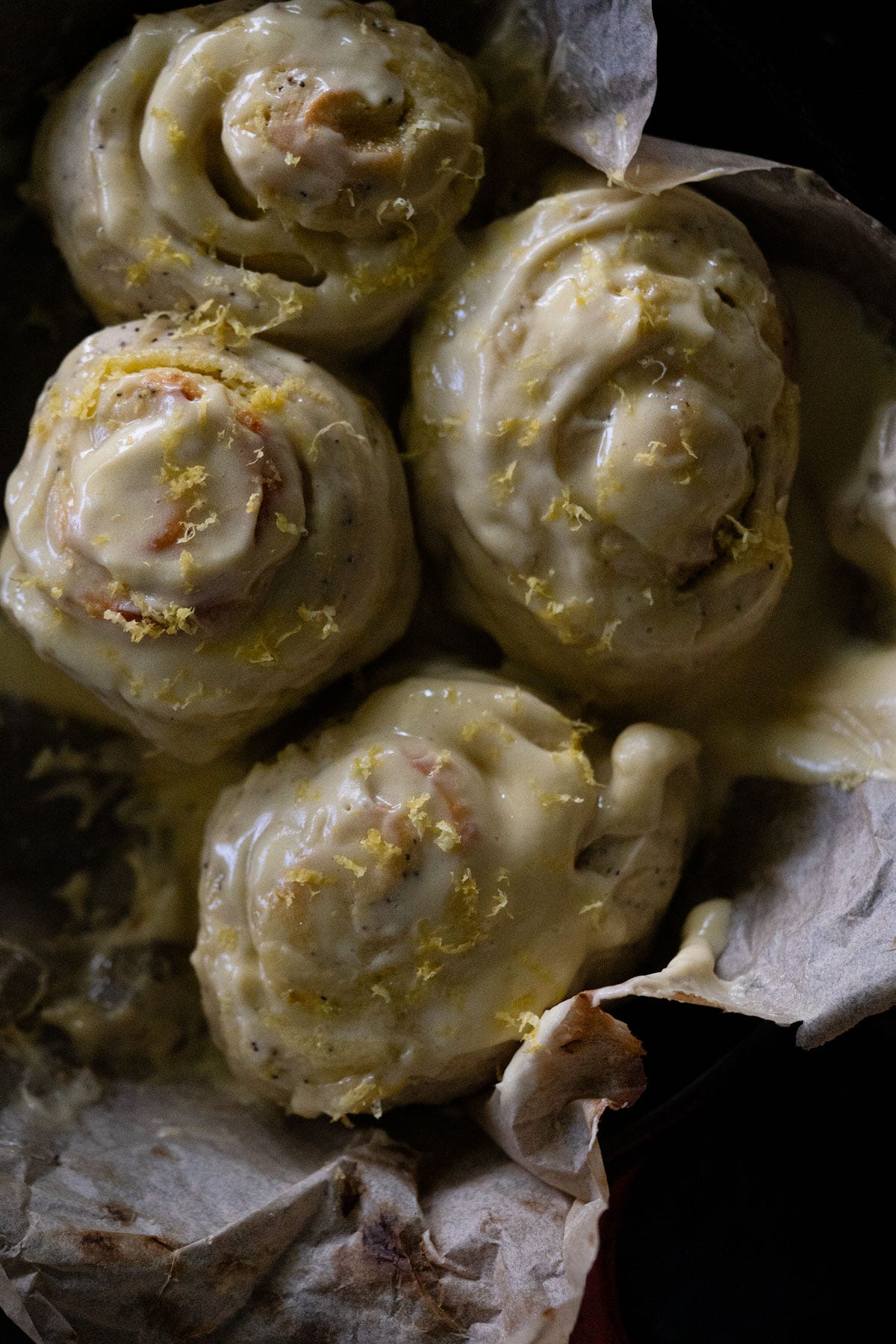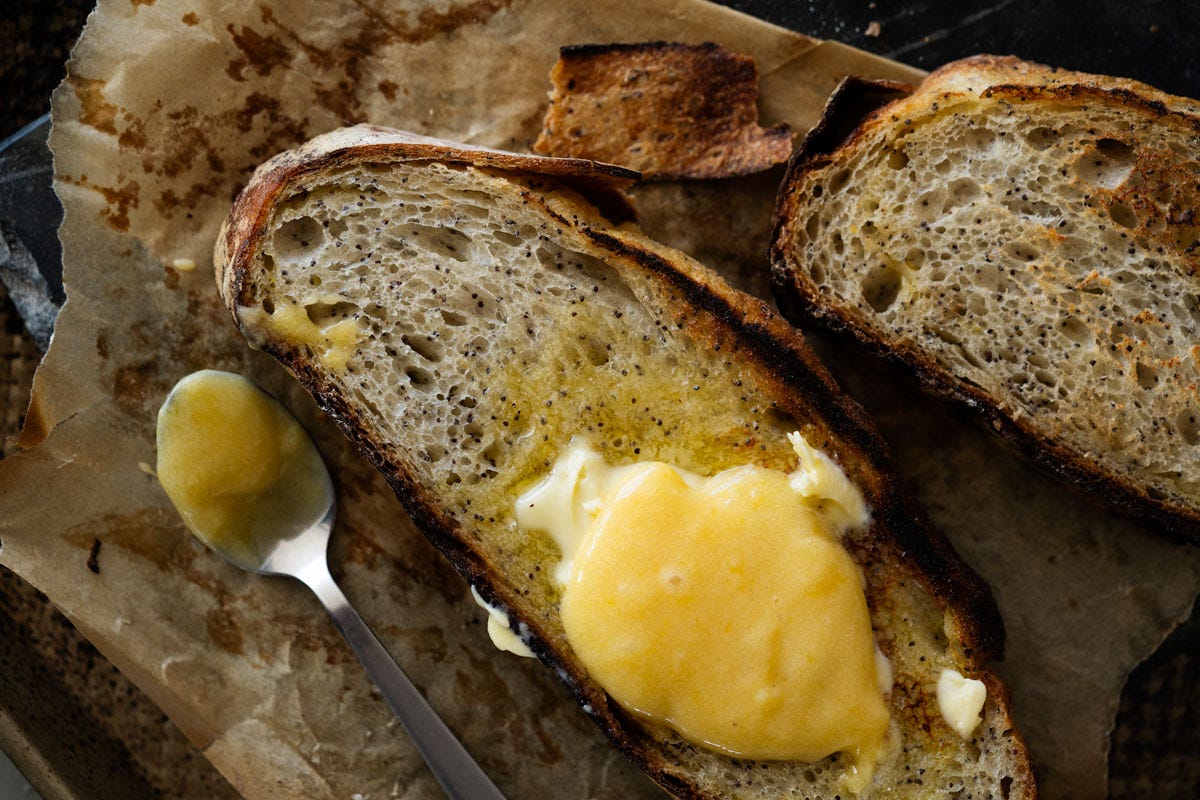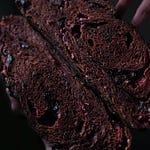Speckled with poppy seeds and filled with lemon curd, these sweet rolls are the definition of bright.
but first, what absolutely no one asked: Paola, what happened to Montana?
about her early demise: twas the summer of 2023 in the Sierra Nevada, with temperatures reaching 110°F easily during the day (that’d be around 43 for those who are celsius minded)– and it very quickly became clear that, well, not much thrived in that heat.
Still, some of us fared better than others– so while Tito and Hoopje (my german shepherd and ragdoll kitten) live roasted under their double coats; a quick dip under the faucet was enough to keep our rescued tuxedo cat, Mr Barry White, in the great outdoors (i.e. our veggie garden).
But the actual surprise came when working with my two sourdough starters: Montana and Yosemite. As while the later thrived in the soaring temperatures with not much but an extra feeding (or a high feeding ratio) to sustain the tremendous increase in activity, the former began to succumb to fungus every few days. Because forget about doubling in size, all Montana could muster were a few bubbles here and there.
The only possible explanation I could think of?
As while Yosemite’s history of it being a 300+ year old starter hailing from a small bakery in Italy is something which can in no way be confirmed nor denied (I think?), some of you might recall that Montana’s provenance is simple: she was kept for over 100 years by a single family in, you may’ve guessed it, Montana– simply passed down for a couple of generations.
So my best guess as to her languishing state (after three years under my care)?
Well if you’ve ever been to Montana you’d know: temperatures absolutely never (ever)(ever!!) get as high as they do in the Sierra Nevada of California. In fact, it’s not rare to get snow in June (and September).
And so as she struggled to thrive in the constant summer heat of the valley (and I began to test said theory by only taking her out of the fridge and feeding her during our cooler nights)(and she did in fact begin to recover), I thought about all the research being done on our own microbiomes– how unique they are to each of us, and to which part of the world we live in.
Because say– did you know that migration from a non-Western country to the United States is associated with an immediate loss of gut microbiome diversity and function? And so subsequently with an increase incidence in metabolic disease?
And several studies are now pointing to how loss of diversity (in general, not just in the immigrant population)(as there’s clearly some very big cons to sterilizing our entire lives) can make room for so dubbed “opportunistic bacteria”, often associated with illness, to come and wreak havoc. And its key importance? That given the gut brain axis, said degeneration has now been linked to neurodegenerative disease (think Alzheimer’s).
So while the first signs of an imbalanced gut might be a mere inconvenience (say something like thrush– where you’ve an overgrowth of yeast)(and can even manifest as a flakey scalp), persistent imbalances can lead to actual untimely deaths (because colon cancer too).
i.e. healthy metabolic function is the direct consequence of a healthy microbiome
And there’s absolutely no way around it.
So it’s no surprise why, plant medicine aside, personally changing my diet to one rich in fermented foods and some complex carbs (plus vip more time frolicking outdoors in nature)(i.e. in a non sterile environment) led to some big changes.
As after a few years of focusing on various forms of keto, which did help tremendously in teaching me to regulate my sugar overconsumption (not breaking news: we’re all eating way more sugar than we need), I was personally missing a lot of complex carbs for my own microbiome to thrive (which presented, perhaps obviously, as intense carb cravings = creating an entire blog of keto baked goods)(lmao, talk about not listening to my body)(and I mean, in the end over 150K of you reading this today are originally here too because of said intense carb cravings while under keto 👀).
And that’s were I firmly believe we had it wrong: sure, our bodies might not directly need carbs in order to survive, but our gut microbiomes certainly do (and we in turn do need them to thrive).
And why am I so certain about this?
Well, complex studies aside, because simply watch what happens if you feed your sourdough starters solely a carb free flour (say lupin or almond flour).
Like, I dare you.
You’ll simply kill them rapidly (think a couple days).
(side note: this is why many forms of keto actually did still suggest consuming veggies, fiber etc)(I’m talking about the extreme and a lot of the processed foods that emerged)
Because I triple dare you to feed your starters a so-dubbed “natural” sweetener (start with allulose, work your way up to erythritol and finish the job with xylitol).
You’ll pretty much instantly kill them (particularly with xylitol, which is why it’s so popular in dentistry products– it inhibits bacterial growth).
And this, yes you guessed it, is why you immediately need to make a trip to the loo after consuming all these highly processed sugar-free foods– congratulations you literally killed your own sourdough starter.
(ok, so its more resilient than that and it’ll immediately start to recover, but you’ll be scraping it constantly rather than building a thriving and resilient culture)(because daily intakes of substances which do harm it, antibiotics included, will undoubtedly lead to horrendous gut health in the long run)(and therefore terrible metabolic health)(taking down your mental health in the process).
So yeah.
My best guess regarding our sourdough starter conundrum is simple: Montana was composed of a particular combo of yeast and bacteria that thrived in cooler temps (as was handled solely by a single family, who tend to have similar microbiomes), while Yosemite has seemingly been tumbling about the globe from hand to hand (i.e. arguably gaining diversity by sampling various ecosystems and microbiomes).
Though can we know for sure what happened? Probably not, also because Montana really didn’t make it into fall (may she rest in peace, for she became too exhausting to care for).
But the last experiment I did try? Adding a bit of Yosemite to the mix.
And just like the promising research of literal poop transplants (yes, you read that right– literal 💩) in the human and mice studies shows, the Montana-Yosemite hybrid began to thrive in the summer heat as the stronger culture promptly took over.
So this is where my fascination with sourdough (beyond deliciously crunchy and fluffy bread) lies: in that I learned so much about listening and taking care of my own gut microbiome, by ensuring the starters thrived.
but what six of you did ask: Paola, where is my sourdough starter?
Like I said last week, I’m keeping all my promises to you and I’m back in the US for a few days only so I’ll be shipping the six starters that are pending this week.
(and if yours succumbed for whatever reason just reply to this newsletter too and I’ll ship you another one)
(and if you’re new here, we started off the year shipping out little gifts of my mighty Yosemite with yearly subscriptions to the newsletter)(you know, to get your baking adventures started on the right foot).
So given that I’m in town (and I likely won’t be back until the end of the year!), I’m doing it again for three days only this week:
I’m mailing my 100yr sourdough starter (alive!!) to you 🌋
I’m gifting everyone US-based with a yearly subscription a little live clone of my prized starter to get you started on your sourdough adventure (they’re generally worth around $30)(and are much more valuable than a dehydrated one, as its a culture that’s been maintained for decades… and it shows).
because what you’re skipping: four to six months of daily feedings to create an “established colony”:
but now, for today’s bonus recipe:
a sourdough lemon poppy seed loaf 💁♀️
Because the rolls weren’t enough: speckling sourdough with poppy seeds and marbling in some homemade lemon curd makes for a 10/10 beauty:















